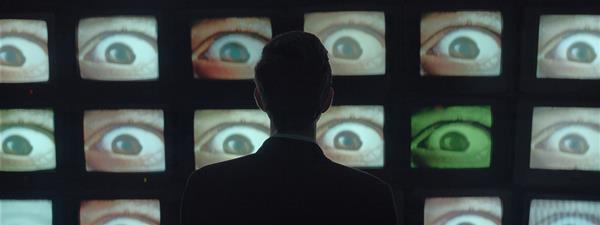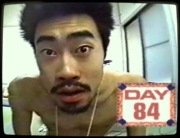

The Antenna manages to expertly weave horror and political allegory to create a fantastic slow burn of a film. That writer-director Orçun Berham made this scathing indictment of propaganda in Turkey, which, like many other nations, is slowly sliding toward authoritarianism, is remarkable. The filmmaker is merciless in depicting how that trend affects and makes zombies of ordinary citizens.
Mahmet (Ihsan Önal) works as the security guard/doorman/maintenance man at a large and dilapidated apartment complex. In fact, it seems that this entire nameless city is a collection of such buildings. In a fantastic sequence, Mehmet trudges to work passing monstrosity after monstrosity of Soviet-style apartment blocks, with no sign of nature in sight. On this particular day, a satellite dish is to be installed on top of a building so that everyone has access to the national midnight television broadcast. Things begin to go awry almost immediately when the guy installing the dish falls to his death. Mehmet is then asked to inspect the dish, and when he does so, he notices viscous black liquid emanating from it.
We also meet some of the occupants of the complex. Yasemin (Gül Arici), a young woman and free spirit, lives under the yoke of her loving but stern father, Firat (Enis Yildiz), who wants to arrange her marriage. Mehmet, who has taken a benevolent shine to her, gives her a train ticket (apparently much treasured in this dystopian society) to get out of the city. There are also a young boy whose parents are having marital troubles and a woman in her thirties desperate for a cure for aging.
Into their lives comes the satellite-dish-emanating sludge, oozing down the walls, bubbling up from the floor, pouring through the tap, changing or ending lives in various unpleasant ways. All of this is seen through the eyes of Mehmet, who becomes wise to what may be going on and alerts the building manager, Cihan (Levent Ünsal), who, of course, tells him everything is fine.
Önal has a fantastic stone face, with wide deep-set eyes and the look and reactions of a silent movie actor. He is our eyes and ears and the connection to the other residents. When he gives Yasemin the above mentioned ticket, she doesn’t want to take it and suggests that he should use it instead. He refuses. He knows it isn’t in his nature to go anywhere. He is passive—until he learns he can no longer be.
The acting is fine throughout, but the star is the technical team. Cinematographer Engin Özkaya, editor Burc Alatas, and the sound department combine to make Behram’s vision uniquely disturbing. Envisioning the film as a series of vignettes that slowly work to a fever pitch once the midnight broadcast begins, they finally bust loose and unleash a finale that can only be described as Terry Gilliam meets David Cronenberg.
Behram also models John Carpenter’s ability to quietly build suspense, and he has Carpenter’s confidence. This is a director completely in control of his story, and Behram is ruthless. The last moment we see of the young boy is one of mortal danger that the director mercifully cuts away from, yet there is neither rescue nor resolution. We don’t know what happened. The boy’s story is done.
The message is simple. Propaganda and mass media and especially propaganda via mass media either kill people or turn them into literal faceless automatons. It’s a message that seems timely in any era, but most especially now.






Leave A Comment